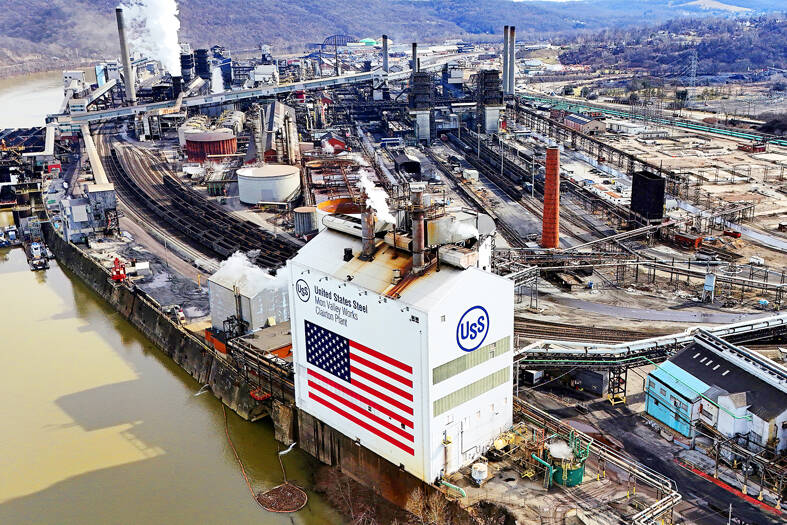Two US steel-state Democrats in tough re-election fights are urging US President Joe Biden to do more to stop the proposed acquisition of United States Steel Corp by Japan-based Nippon Steel Corp.
“We’re pushing the White House on national security grounds and on trade enforcement,” US Senator Sherrod Brown of Ohio told Bloomberg Television. “And fundamentally what this means for American workers and American jobs.”
United States Steel shareholders on Friday voted in favor of the US$14.1 billion takeover offer by Nippon Steel, even though Biden has publicly opposed the takeover and said the company should be US-owned.

Photo: AP
The Biden administration is putting the deal through a secretive national security review process, one that is typically reserved for businesses involving adversarial nations rather than allies like Japan. The decision by the Committee on Foreign Investment in the US could be contested in court.
The US Department of Justice also opened an extended antitrust investigation into the takeover, creating additional hurdles to closing the deal. As a result, the companies are considering delaying the expected deal timeline.
Brown’s Senate race is considered one of the most competitive contests this November, and appealing to industrial workers is key to his re-election hopes. US Steel went against the request of the steelworkers union, which would have preferred the Ohio-based Cleveland-Cliffs Inc mining company make the acquisition.
Democratic US Senator Bob Casey, facing a competitive re-election in next-door Pennsylvania, where US Steel is headquartered in Pittsburgh, also is championing the cause.
“My principal concern is those steelworker jobs and this deal gives me great concern about the threat to those jobs,” Casey told Bloomberg Television.
Casey said he is inquiring with the White House about how conflict over the acquisition was handled in Biden’s discussions with Japanese Prime Minister Fumio Kishida during his state visit last week.
When asked about the takeover at a joint news conference with Kishida, Biden reiterated his promise to back the United Steelworkers Union in its opposition to the deal.
Presumptive Republican presidential nominee Donald Trump also has said he would try to block the deal if elected.
Nippon Steel in December last year agreed to buy US Steel at a significant premium, saying the deal would make the US steel industry more competitive.

PROTECTION: The investigation, which takes aim at exporters such as Canada, Germany and Brazil, came days after Trump unveiled tariff hikes on steel and aluminum products US President Donald Trump on Saturday ordered a probe into potential tariffs on lumber imports — a move threatening to stoke trade tensions — while also pushing for a domestic supply boost. Trump signed an executive order instructing US Secretary of Commerce Howard Lutnick to begin an investigation “to determine the effects on the national security of imports of timber, lumber and their derivative products.” The study might result in new tariffs being imposed, which would pile on top of existing levies. The investigation takes aim at exporters like Canada, Germany and Brazil, with White House officials earlier accusing these economies of

Teleperformance SE, the largest call-center operator in the world, is rolling out an artificial intelligence (AI) system that softens English-speaking Indian workers’ accents in real time in a move the company claims would make them more understandable. The technology, called accent translation, coupled with background noise cancelation, is being deployed in call centers in India, where workers provide customer support to some of Teleperformance’s international clients. The company provides outsourced customer support and content moderation to global companies including Apple Inc, ByteDance Ltd’s (字節跳動) TikTok and Samsung Electronics Co Ltd. “When you have an Indian agent on the line, sometimes it’s hard

‘SACRED MOUNTAIN’: The chipmaker can form joint ventures abroad, except in China, but like other firms, it needs government approval for large investments Taiwan Semiconductor Manufacturing Co (TSMC, 台積電) needs government permission for any overseas joint ventures (JVs), but there are no restrictions on making the most advanced chips overseas other than for China, Minister of Economic Affairs J.W. Kuo (郭智輝) said yesterday. US media have said that TSMC, the world’s largest contract chipmaker and a major supplier to companies such as Apple Inc and Nvidia Corp, has been in talks for a stake in Intel Corp. Neither company has confirmed the talks, but US President Donald Trump has accused Taiwan of taking away the US’ semiconductor business and said he wants the industry back

PROBE CONTINUES: Those accused falsely represented that the chips would not be transferred to a person other than the authorized end users, court papers said Singapore charged three men with fraud in a case local media have linked to the movement of Nvidia’s advanced chips from the city-state to Chinese artificial intelligence (AI) firm DeepSeek (深度求索). The US is investigating if DeepSeek, the Chinese company whose AI model’s performance rocked the tech world in January, has been using US chips that are not allowed to be shipped to China, Reuters reported earlier. The Singapore case is part of a broader police investigation of 22 individuals and companies suspected of false representation, amid concerns that organized AI chip smuggling to China has been tracked out of nations such